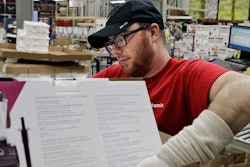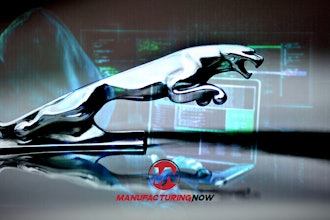W
H
IT
E
PA
PE
R
5 TIPS FOR MANAGING
FOOD AND BEVERAGE
SUPPLY CHAIN
CONTENT
AUTOMATE, AUTOMATE, AUTOMATE ............................................................................. 1
PLAN FOR FUTURE DEMAND ........................................................................................ 2
MAINTAIN DETAILED REGULATORY COMPLIANCE DATA ................................................. 3
CONTROL COSTS BY MINIMIZING WASTE ..................................................................... 3
LINK MULTIPLE LOCATIONS ......................................................................................... 4
SUMMARY AND SUGGESTIONS .................................................................................... 5
15 TIPS FOR MANAGING FOOD AND BEVERAGE SUPPLY CHAIN
5 TIPS FOR MANAGING FOOD AND
BEVERAGE SUPPLY CHAIN
The high-volume, transaction-intensive nature of food and beverage supply chain
logistics presents significant challenges. When raw materials, ingredients and
manufactured products have a limited shelf life, processes such as order intake,
allocation, picking, packing, and shipping become increasingly difficult to manage
and predict.
Managing the many moving parts of the supply chain process is difficult, but
vital to the success of manufacturing operations. Changes in market demand, vendor
offerings, material process and regulations, among many other reasons, may lead to
the need to adjust your supply chain processes. If your operation is so rigid that an
adjustment to the supply chain causes issues, the situation may prove costly.
How can your organization’s supply chain remain agile and efficient? Carefully
managing the flow of materials and finished products into and out of your
manufacturing center is vital to effective operations, but is also useful in pinpointing
areas of improvement, as well as potential deterrents to agility.
In this white paper, we will examine five tips that could help your organization
streamline supply chain, maintain compliance with food safety guidelines and
improve productivity, all while cutting costs.
AUTOMATE, AUTOMATE, AUTOMATE
It is very likely that your supply chain involves many steps and processes, most of
which continually repeat as operations progress. These repetitive processes present
the perfect opportunity for automation. Seizing automation opportunities can
provide instant and long-term benefits; the more steps and procedures you can
automate within your supply chain, the less time employees will have to spend
ensuring that processes are completed as planned.
Unfortunately, automating your supply chain isn’t always as easy as it sounds.
The process involves a number of steps, and potential expenditures.
When automating your food and beverage supply chain, it is important to:
• Explore available technology: From handheld bar code scanners to tablets,
manufacturing supply chain technology is always improving. Utilizing the best
technology possible will help to streamline your operations by limiting human
error and improving information gathering.
25 TIPS FOR MANAGING FOOD AND BEVERAGE SUPPLY CHAIN
• Centralize information: In food and beverage supply chain operations,
information is invaluable. Collecting data relating to shelf life, inventory counts
and future demand in one centralized location will help to maintain the flow of
materials and products throughout your manufacturing center. A comprehensive
enterprise resource planning (ERP) software, such as IFS Applications™, is a
sound strategy to automate your information gathering and centralization
efforts.
• Create detailed processes: Outlining the many processes involved in your supply
chain in great detail is important to efficient operations. The more detailed your
processes are, and the more consistent they become, the easier it is to automate
them.
IFS Applications offers the power and functionality you need to integrate a range of
technology, information-gathering software and process management software into
a single solution, thereby improving your supply chain’s efficiency.
PLAN FOR FUTURE DEMAND
Taking a proactive approach to address the future of your food and beverage supply
chain will result in a reduction of surprises, shortages and unnecessary spending.
Carefully considering and planning for both the near future and the long term is the
only way to keep pace with the competition.
When planning for future demand, it is important to consider many variables,
including:
• Market fluctuations: As market demands change, your supply chain will need to
evolve. Predicting market fluctuations isn’t always easy, however. Fortunately,
the more information you have, and the more attention you pay to the changing
market, the more agile your supply chain will be. Most companies shape demand
by promotions and campaigns. It is often a challenge to align the supply planning
with these activities. It is very important to make sure the manufacturing plans
are aligned with the marketing activities.
• Changes in customer base: As your target market changes, your approach to
producing products must evolve. Tracking trends in data related to demand, sales
and other key areas will help you to maintain the ability to continually serve
your target market.
• Material costs and availability: The short shelf life of food and beverage materials
means that companies must purchase when necessary. This makes it important
to carefully manage margins and maintain cost visibility. An ERP system will
improve cost visibility and support decision making.
35 TIPS FOR MANAGING FOOD AND BEVERAGE SUPPLY CHAIN
Much like in the automation process, an ERP solution is vital to predicting the
future of your food and beverage supply chain.
IFS Applications’ integrated planning tools offer full support for demand planning,
as well as production and procurement planning. The solution allows you to review
trends and historical data, making it possible to conduct strategic forecasting to
streamline ordering, inventory and production.
MAINTAIN DETAILED REGULATORY COMPLIANCE DATA
Few industries face the same level of scrutiny as food and beverage. With a wide
array of state, federal and global food safety guidelines to adhere to, maintaining
compliance is a difficult task. Demonstrating that compliance in the event of an
audit is just as challenging.
To maintain compliance with food and safety guidelines, it is important to:
• Gather precise data: It is important to be thorough and precise when addressing
regulatory compliance issues. When facing an audit or attempting to gain a
certification, the amount of information you can provide will directly impact
the outcome of the process.
• Track everything: Organizations that make the effort to carefully track the flow
of materials into and out of their operation centers are better equipped to address
regulatory issues. Keep detailed records of materials, processes, maintenance,
and cleaning efforts. The more you track, the better prepared your organization
is to address compliance audits and certifications.
• Maintain historical records: Predicting compliance audits is all but impossible,
making it important to keep detailed historical records. By keeping these
records, your organization can quickly respond to regulatory reviews, and can
pinpoint trends that may lead to future regulatory issues.
ERP solutions often provide the power food and beverage manufacturers need to
track and monitor regulatory compliance. IFS Applications offers the tracking and
reporting functions needed to ensure compliance with each and every regulation
governing your organization.
CONTROL COSTS BY MINIMIZING WASTE
Many costs associated with the supply chain are difficult or impossible to control,
including fuel rates, labor and materials costs. With that in mind, it is important to
explore other areas where costs can be controlled.
One cost that your organization can directly control relates to material waste. By
45 TIPS FOR MANAGING FOOD AND BEVERAGE SUPPLY CHAIN
controlling the amount of raw materials and finished products lost to waste, your
business will reduce production costs and improve overall profit margins.
How can you control waste costs in your supply chain? There are many strategies
for doing so, including:
• Managing expiration dates: The vast majority of materials involved in the pro-
duction of food and beverage products have a limited shelf life. Maintaining
real-time awareness of the shelf life of materials in your supply chain and ensuring
that materials are used properly within that time frame will dramatically reduce
waste and the costs associated with it.
• Avoiding overstocking: An overstocked inventory is a hotbed for wasted materials.
If your organization cannot utilize an overstocked material within its shelf life,
that material is lost to waste. Maintaining adequate inventory without over-
stocking materials by accurately forecasting demand and maintaining lean
manufacturing helps to eliminate waste.
• Addressing quality issues: Final products that do not meet quality standards or
food safety guidelines must be disposed of. Pinpointing and managing quality
control issues quickly and accurately will help to eliminate waste stemming from
subpar final products.
• Sequence production: Maintaining optimal production sequences helps to
eliminate waste. By tracking production levels and sequences, organizations can
alter processes to improve efficiency and reduce waste.
Utilizing an ERP solution to aid in your waste reduction efforts will increase the
likelihood of success. IFS Applications offers comprehensive materials tracking
capabilities, allowing you to remain ever-aware of spoilage dates, inventory levels
and trends in quality control issues.
LINK MULTIPLE LOCATIONS
If your food and beverage manufacturing operation spans more than one location,
it is important to ensure that your supply chain flows logically through each site.
Linking multiple locations together using ERP software will aid in your efforts to
maintain consistent inventory, shipping and production. Without this link, the
strength of your supply chain is likely to deteriorate, with each location left to
handle the challenges of operation without support from the others.
An ERP solution is invaluable when attempting to streamline supply chain
between multiple sites. By connecting the data from each location, your supply
chain becomes more manageable. IFS Applications supports traceability throughout
multiple locations, making it easier to manage every aspect of your organization’s
supply chain.
55 TIPS FOR MANAGING FOOD AND BEVERAGE SUPPLY CHAIN
SUMMARY AND SUGGESTIONS
Managing the many pieces involved in a complex food and beverage supply chain
requires a great deal of effort. Fortunately, the more real-time information you have
on your supply chain, the easier it becomes to manage. Comprehensive ERP solutions
provide the data you need to automate supply chain processes, plan for future
demand, manage compliance, control waste, and integrate multiple locations.
If your organization does not currently employ an ERP solution, or struggles
to manage supply chain with your current software, consider making a change.
IFS Applications offers the wide range of functionality you need to streamline
supply chain management and reduce overall operating costs.
En
47
10
-1
P
ro
du
ct
io
n:
IF
S
Co
rp
or
at
e
M
ar
ke
tin
g,
N
ov
em
be
r 2
01
4.
P
rin
tin
g:
D
an
ag
år
dL
iT
H
O
A
B,
Ö
de
sh
ög
, S
w
ed
en
.
www.IFSWORLD.com
THIS DOCUMENT MAY CONTAIN STATEMENTS OF POSSIBLE FUTURE FUNCTIONALIT Y FOR IFS’ SOF T WARE PROD -
UCTS AND TECHNOLOGY. SUCH STATEMENTS OF FUTURE FUNCTIONALIT Y ARE FOR INFORMATION PURPOSES
ONLY AND SHOULD NOT BE INTERPRETED AS ANY COMMITMENT OR REPRESENTATION. IFS AND ALL IFS PRODUCT
NAMES ARE TRADEMARKS OF IFS. THE NAMES OF ACTUAL COMPANIES AND PRODUCTS MENTIONED HEREIN MAY BE
THE TRADEMARKS OF THEIR RESPECTIVE OWNERS.
IFS AB ©2014
IFS is a globally recognized leader in developing and delivering
business software for enterprise resource planning (ERP), enterprise
asset management (EAM) and enterprise service management (ESM).
IFS brings customers in targeted sectors closer to their business,
helps them be more agile and enables them to profit from change.
IFS is a public company (XSTO: IFS) that was founded in 1983 and
currently has over 2,600 employees. IFS supports more than 2,200
customers worldwide from local offices and through partners in more
than 60 countries.
For more information about IFS, visit www.IFSWORLD.com
AMERICAS. . . . . . . . . . . . . . . . . . . . . . . . . . . . . . . . . . . . . . . . . . . . . . . . . . . . . . . . . . . . . . . . . . +1 888 437 4968
ARGENTINA, BRAZIL, CANADA, ECUADOR, MEXICO, UNITED STATES
ASIA PACIFIC . . . . . . . . . . . . . . . . . . . . . . . . . . . . . . . . . . . . . . . . . . . . . . . . . . . . . . . . . . . . . . +65 63 33 33 00
AUSTRALIA, INDONESIA, JAPAN, MALAYSIA, NEW ZEALAND, PHILIPPINES,
PR CHINA, SINGAPORE, THAILAND
EUROPE EAST AND CENTRAL ASIA . . . . . . . . . . . . . . . . . . . . . . . . . . . . . . . . . . . . . +48 22 577 45 00
BALKANS, CZECH REPUBLIC, GEORGIA, HUNGARY, ISRAEL, KAZAKHSTAN,
POLAND, RUSSIA AND CIS, SLOVAKIA, TURKEY, UKRAINE
EUROPE CENTRAL . . . . . . . . . . . . . . . . . . . . . . . . . . . . . . . . . . . . . . . . . . . . . . . . . . . . . . . . . +49 9131 77 340
AUSTRIA, BELGIUM, GERMANY, ITALY, NETHERLANDS, SWITZERLAND
EUROPE WEST . . . . . . . . . . . . . . . . . . . . . . . . . . . . . . . . . . . . . . . . . . . . . . . . . . . . . . . . . . . +44 1494 428 900
FRANCE, IRELAND, PORTUGAL, SPAIN, UNITED KINGDOM
MIDDLE EAST AND AFRICA . . . . . . . . . . . . . . . . . . . . . . . . . . . . . . . . . . . . . . . . . . . . . . . .+971 4390 0888
INDIA, SOUTH AFRICA, SRI LANKA, UNITED ARAB EMIRATES
NORDIC . . . . . . . . . . . . . . . . . . . . . . . . . . . . . . . . . . . . . . . . . . . . . . . . . . . . . . . . . . . . . . . . . . . . .+46 13 460 4000
DENMARK, NORWAY, SWEDEN
FINLAND AND THE BALTIC AREA. . . . . . . . . . . . . . . . . . . . . . . . . . . . . . . . . . . . . . . +358 102 17 9300
ESTONIA, FINLAND, LATVIA, LITHUANIA
ABOUT IFS
5 Tips for Food and Beverage Supply Chain
The high-volume, transaction-intensive nature of food and beverage supply chain logistics presents significant challenges. When raw materials, ingredients and manufactured products have a limited shelf life, managing supply chain becomes increasingly difficult. By following these five strategies, you can take the challenges out of your food and beverage supply chain.
Latest in Home






















